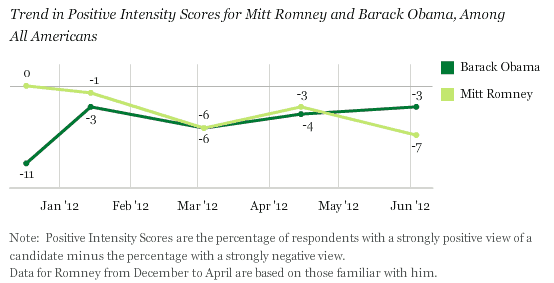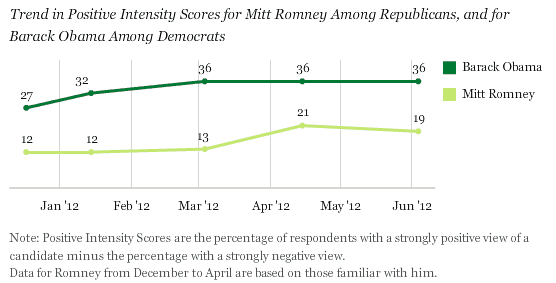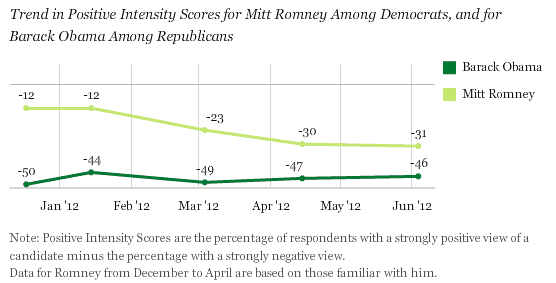PRINCETON, NJ -- More Americans continue to hold strongly negative than strongly positive views of both Mitt Romney and Barack Obama. This has been the case for much of the campaign to date, on the basis of Gallup's Positive Intensity Score, the net of strongly favorable opinions minus strongly unfavorable opinions of each candidate. Since December, Romney's scores have trended more negative and Obama's more positive.

The latest update on Positive Intensity Scores is from June 1-4 Gallup polling. Currently, 22% of Americans have a strongly positive view of Obama and 25% a strongly negative one, yielding a score of -3 for him. Romney's -7 score is based on 11% strongly favorable and 18% strongly unfavorable opinions.
Obama elicits a greater share of strong opinions in both positive and negative directions than does Romney. In total, 47% of Americans have a strong opinion of Obama, compared with 29% for Romney.
Thus, it is perhaps not surprising that Obama engenders more intensely positive feeling from his own party's supporters than Romney does from his. Obama's +36 Positive Intensity Score among Democrats, including independents who lean to the Democratic Party, is nearly double Romney's +19 among Republicans and Republican-leaning independents.
Romney's score among Republicans is down just slightly from the +21 he registered in the days after Rick Santorum ended his campaign for the Republican nomination, making Romney the presumptive nominee. Prior to attaining that status, Romney's Positive Intensity Scores among his fellow Republicans were in the low double digits.
Obama's scores among Democrats have likewise stabilized at a slightly higher level than was seen at earlier points in the campaign.

Romney's scores among Democrats are holding steady, even as he has shifted his campaign to the general election contest against Obama. In June, his intensity score among Democrats is -31, compared with -30 in April. But from a longer-term perspective, Democrats have grown more intensely negative toward Romney as it has become increasingly likely he would be Obama's opponent.
Republicans continue to show a much greater degree of strongly negative opinion toward Obama than Democrats do toward Romney.

Implications
Americans with strongly negative opinions of Romney or Obama continue to outnumber those with strongly positive opinions. When the strength of opinion is not taken into account, however, views of both Romney (44% favorable and 42% unfavorable) and Obama (52% favorable, 43% unfavorable) are more positive than negative overall.
Intensity of opinion matters, because in theory those who have stronger opinions are more likely to act on those opinions, which in the election context means voting. Indeed, Gallup finds a higher percentage of those with strong opinions of either Romney or Obama saying they "definitely will vote" than is the case for those without strong opinions.
In an election in which an incumbent is running, opinions about the incumbent may matter more than opinions about his opponent. Currently, those who have strongly positive opinions of Obama are about equally as likely as those who have strongly negative opinions of him to say they will definitely vote this fall (90% and 87%, respectively).
Thus, one key to the election going forward will be whether Americans' strongly negative opinions of Obama continue to exceed strongly positive opinions of him.
Track every angle of the presidential race on Gallup.com's Election 2012 page.
Survey Methods
Results for this Gallup poll are based on telephone interviews conducted June 1-4, 2012, on the Gallup Daily tracking survey, with a random sample of 2,069 adults, aged 18 and older, living in all 50 U.S. states and the District of Columbia.
For results based on the total sample of national adults, one can say with 95% confidence that the maximum margin of sampling error is ±3 percentage points.
For results based on the total sample of 892 Republicans and Republican-leaning independents, one can say with 95% confidence that the maximum margin of sampling error is ±4 percentage points.
For results based on the total sample of 902 Democrats and Democratic-leaning independents, one can say with 95% confidence that the maximum margin of sampling error is ±4 percentage points.
Interviews are conducted with respondents on landline telephones and cellular phones, with interviews conducted in Spanish for respondents who are primarily Spanish-speaking. Each sample includes a minimum quota of 400 cell phone respondents and 600 landline respondents per 1,000 national adults, with additional minimum quotas among landline respondents by region. Landline telephone numbers are chosen at random among listed telephone numbers. Cell phone numbers are selected using random-digit-dial methods. Landline respondents are chosen at random within each household on the basis of which member had the most recent birthday.
Samples are weighted by gender, age, race, Hispanic ethnicity, education, region, adults in the household, and phone status (cell phone only/landline only/both, cell phone mostly, and having an unlisted landline number). Demographic weighting targets are based on the March 2011 Current Population Survey figures for the aged 18 and older non-institutionalized population living in U.S. telephone households. All reported margins of sampling error include the computed design effects for weighting and sample design.
In addition to sampling error, question wording and practical difficulties in conducting surveys can introduce error or bias into the findings of public opinion polls.
View methodology, full question results, and trend data.
For more details on Gallup's polling methodology, visit www.gallup.com.
